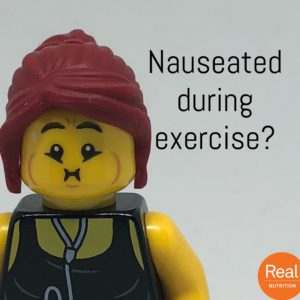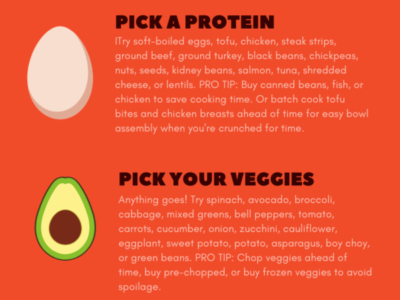
There is nothing worse than feeling nauseated while exercising. If you’re trying to push yourself in a competition or training session and find that you’re feeling sick, here are a few reasons why this might be happening and what you can do about it.
Your blood sugar is low.
Low blood sugar can result from not eating enough prior to exercise, not eating during exercise lasting more than 60 minutes, or in people with diabetes. One of the symptoms of low blood sugar is nausea. If you notice a pattern of nausea in your workouts, eat before or during the session. Something easy and quick-to-digest, like a white mini-bagel, fruit juice, or gummies will do the trick.
You are over-exerting yourself.
Slow down, take some deep breaths, and take a break until you feel better. Less intensity can help you recover and let the nausea subside. If you experience this on a regular basis, wear a heart rate monitor to track how hard you can push.
You just ate.
During exercise, blood shunts to your skeletal muscles and away from your digestive system. If you are pushing too hard, you could feel nauseated because blood flow is lessened to your digestive system. Also don’t eat right before exercise, especially foods that are greasy, fatty, or have a lot of fiber.
You may be dehydrated.
Not getting enough fluid can make you feel weak, dizzy, overheated, lightheaded, and more. Dehydration can be a medical emergency. Stop exercising and seek treatment if needed. Drink fluids with electrolytes to restore hydration.
You may be over-hydrated.
This can also be a serious medical condition. Called hyponatremia, over-hydration can result in diluted electrolytes, particularly sodium, in your blood. Nausea, dizziness, headaches, and lethargy are some symptoms. Hyponatremia can happen in events like a long marathon where you are going slowly and also have lots of opportunities to drink. It can also happen if you are drinking enough water, but not adding sodium or electrolytes to it.
Knowing your sweat rate can help determine how much and how often you should drink. Here’s how to calculate it:
- Weigh yourself with as little clothing as possible before your workout.
- Do your workout, keeping track of how much you drink during it.
- Weight yourself afterward in the same amount of clothing.
- Do the math: how much weight did you lose? Each pound of weight lost means you need to drink 16 ounces of fluid to re-hydrate again. Be sure to account for the water you consumed. For instance, if you weighed 2 pounds less after your workout, but drank 16 ounces of water during the workout, this means you lost 3 pounds total (because you replaced 1 pound with drinking fluids).
- Next time you work out, you can drink according to your sweat rate. If you know you lose 3 pounds of fluids during a 2-hour training session, aim to drink about 32-48 ounces (2-3 pounds) of fluids during your training. This can prevent over- or dehydration.
Keep in mind, you don’t always need to exactly replace your sweat losses within a workout. It’s ok to lose 1-3 pounds if your performance or hydration status are not acutely affected. Be smart. If it’s hot or humid, pay attention. If you find your mind becoming less clear, you miss easy shots, you feel dizzy or nauseated–take a break.
Take home message: If you feel nauseated during exercise, there can be several reasons for it. Paying attention to what you eat, when you eat, and how much you eat and drink can help you troubleshoot. Talk with a sports dietitian for more help and to fine-tune your nutrition plan. Appointments available online! Schedule today!
~Disclaimer: This is general information and is not intended as medical advice. Consult with your doctor before making any diet or lifestyle changes.
Check out our amazing nutrition resources, including on-demand courses, free downloads, and webinar replays.
- Nutrition for Climbers
- The Ultimate Guide to Useful Sports Supplements
- Ditch Diets and Become an Intuitive Eater
And be sure to follow us on Instagram!




